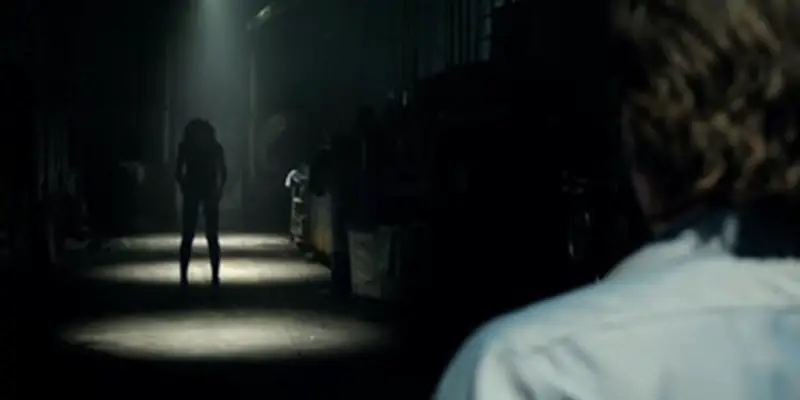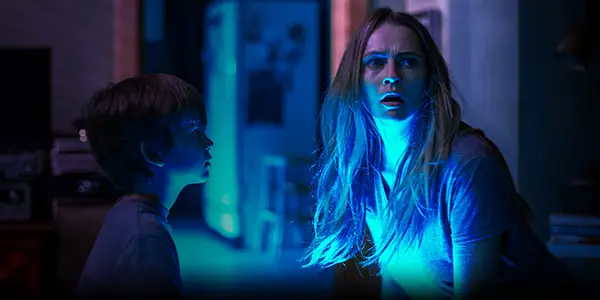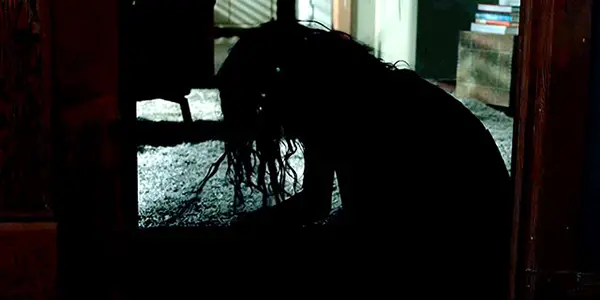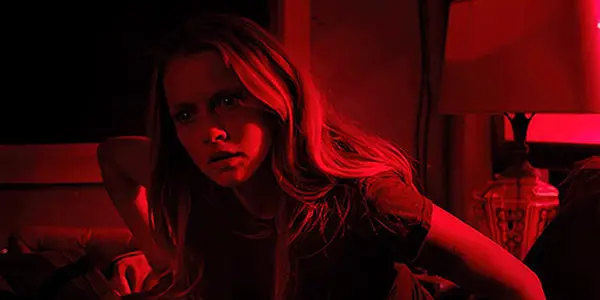LIGHTS OUT: Interesting Concept, Poor Execution

David is a film aficionado from Colchester, Connecticut. He enjoys…
Lights Out initially seemed to be promising. Though reminiscent of other horrors I have seen, the idea of a creature that only lives in the dark is still an interesting and potentially frightening subject; that is, if it’s composed with the right balance in both story and direction.
Unfortunately, like many dime-a-dozen horror films, Lights Out suffers from an all-in approach, choosing to simply attempt to scare the viewer by any means necessary rather than working on making it genuine. It is a mostly forgettable film, though not without at least a shadowy frame of something more positive.
Predictable, with no sense of mystery
The concept of Lights Out is what drew me to it. A family, including a son (Gabriel Bateman), an older daughter Rebecca (Teresa Palmer), and their mother Sophie (Maria Bello), are continually haunted by a spectral shape of a woman, who can only be seen when the lights are completely out.
It is soon discovered that the woman, named Diana, was somebody that the mother knew when she was younger. Diana suffered from a unique condition that made her sensitive to light, and she met Sophie while they were both at a mental institution. Though she was killed during an experimental procedure at the hospital, she has now chosen to come back to haunt Sophie and her family.

The easily summed-up plot brings up the first major issue of Lights Out: there is no sense of mystery underlying the story of the film. A shock or twist ending is not always necessary in horror, yet here we are given a very basic and plainly told background, with little room for additional reveals.
Part of the reasoning for this may be that the film was based on a short that was also written and directed by David F. Sandberg. The short also shows a creature that can only live in the dark, yet with only 2 minutes and 42 seconds runtime, there was clearly no time for an explanation.
Thus, in this full-length feature, some background had to be written in. By not leaving an air of mystery in the story, though, the aspect that made the short so frightening is now sorely missing.
Less is more
An additional problem with Lights Out is the pacing of the story and the scares within it. Recently, I had the pleasure of watching the first season of the Netflix show Stranger Things. Part Steven Spielberg and part Stephen King, the TV series is not only full of ’80s nostalgia, but it manages to be completely terrifying at times.
One of the reasons for this is that, from the start, only a hint of the actual monster from the story is shown, until it finally gets a grand reveal in the conclusion. The idea here is that less is more. What people can imagine is often more terrifying than anything you can show on screen.

Lights Out, being about a creature that only lives in the dark, had perhaps an even more suitable subject for a slow-burning thriller. By revealing Diana only a little at a time, the viewer would be forced to substitute their own wild ideas about the monster into the film.
Instead, in a series of cheap jump-scares and even straight-on appearances, Diana is revealed almost from the very start. And when we do see what her form looks like outside of the darkness, it is not much different than Samara in The Ring or any of a number of other ghastly monsters. There really was a chance to imbue a sense of terror into the film, given its subject, but what it instead feels like is lost potential.
Flat, yet not entirely unlikable characters
The characters of Lights Out are perhaps the film’s only saving grace. The background connecting them is that Sophie, the mother, has somehow allowed Diana into existence because she is too emotionally damaged to push her away. Instead of helping her, though, her daughter and son seem all-too willing to simply allow their mother to live in the dark.
Such an ideal brings up an interesting theme that underlies the film: that Diana seems to be a metaphorical representation of their mother’s neglect. Unfortunately, perhaps due to a short runtime and an almost insatiable desire by Sandberg to simply add more scares to the film, the theme is too underdeveloped to be entirely impactful.

Maria Bello gets her few shining moments as Sophie, yet Teresa Palmer is likely to be the breakout star of the film, playing the daughter Rebecca. Though not given much of a chance to show her acting chops (due to her obligatory role in this film being the appointed “Scream Queen”), Palmer is more of a dynamic presence than the film may give her credit for.
Her rare talent for subtlety may help to push her career farther in the future than just the teen and horror films that she has done so far.
Conclusion
Lights Out manages to live somewhere between the mass of entirely waste-of-time horror films and the rare standouts. There are potentially interesting characters within, and even an outline of a emotionally resonant backbone, yet the majority of the film reeks of wasted potential, especially given the fact that it touches on an almost universal fear of the dark.
Though it works better as a short, Lights Out is at least a valiant first-time feature effort by David F. Sandberg, which could, hopefully, result in better things to come.
What did you think of Lights Out? Do you think it works better as a short or as a full-length feature?
Lights Out is currently out in the US and will open in the UK on August 19. For all international release dates, see here.
Does content like this matter to you?
Become a Member and support film journalism. Unlock access to all of Film Inquiry`s great articles. Join a community of like-minded readers who are passionate about cinema - get access to our private members Network, give back to independent filmmakers, and more.
David is a film aficionado from Colchester, Connecticut. He enjoys writing, reading, analyzing, and of course, watching movies. His favorite genres are westerns, crime dramas, horror, and sci-fis. He also enjoys binge-watching TV shows on Netflix.











